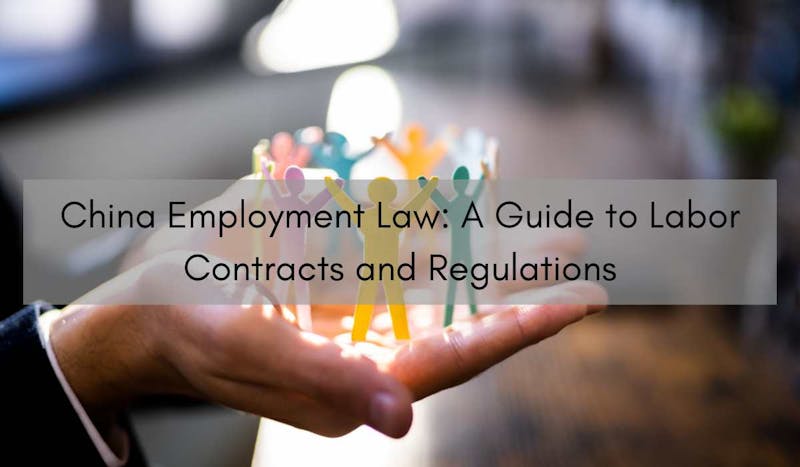Employment regulations in China vary based on national, provincial, and city-level laws, depending on the employee's location.
Labor laws in China are frequently updated and can change rapidly based on government policies.
A company must be legally registered in China before hiring employees, whether they are local or foreign.
If you're planning to do business in China, it's crucial to understand China's employment and labor laws.
Applicable regulations in relation to employment notably include the Labor Law and the Labor Contract Law.
The Labor Law outlines the rights and responsibilities of employers and employees, safeguarding workers' legitimate interests, while the Labor Contract Law was introduced to facilitate the effective enforcement of the employment regulations and principles set out in the Labor Law.
Types of Employment Contracts
Except under circumstances where a contract can be made on an oral basis, a written contract shall be executed to have a valid employment relationship.
There are three types of employment contracts:
Fixed-Term Contracts
Fixed-term contracts outline a specific timeframe for employment. These can apply to both full-time and part-time roles.
Non-Fixed Term Contracts
Non-fixed term contracts offer long-term job security, as termination is only permitted under specific conditions, such as immediate dismissal, dismissal with the service of a 30-day prior notice, or as part of a mass layoff.
Job Contracts
Job contracts are tied to specific tasks or projects rather than a timeframe. Once the task is completed, the employment relationship ends, and severance pay is required. These contracts do not permit probationary periods. However, the legal framework does not address cases of incomplete projects or compensation disputes.
Job contracts are often used for seasonal work with a well-defined scope. However, in many cases, determining when a project is complete can be difficult.
Mandatory and Recommended Clauses in Labor Contracts
Labor contracts shall necessarily include:
- Employer’s name, address, and legal representative or key personnel details.
- Employee’s name, valid address, and identification number.
- Contract terms.
- Job description and work location.
- Work hours, rest periods, and days off.
- Salary details.
- Employer contributions to social insurance.
- Labor protection, working conditions, and occupational hazard safeguards.
Recommended clauses include:
- Probation periods (see details below in relation to the probation period).
- Non-competition agreements.
- Confidentiality clauses.
- Allowances and benefits (especially for foreign employees).
- References to the company handbook or any other internal rules or policies.
Language of Labor Contracts
To ensure legal clarity, labor contracts should be written in Chinese. For foreign employees, contracts are often written in both English and Chinese versions.
All contracts shall comply with statutory requirements, including provisions for paid leave (e.g., maternity leave, holidays, and vacation), health benefits, sick leave, workers’ compensation, and pensions.
Probation Periods
A probationary period can be included for full-time employees if the contract is longer than three months. During such probation period, the salary to be paid must be at least equivalent to 80% of the agreed wage. Such salary shall also be no less than the lowest salary for the same position within the company and above the minimum wage in the company's registered location.
| Contract Duration | Maximum Probation Period |
|---|---|
| Less than 1 year | 1 month |
| 1 to 3 years | 2 months |
| More than 3 years or open-term contracts | 6 months |
Hiring of Foreign Nationals
Employing foreign workers in China involves additional compliance from the employer.
Basic Eligibility Criteria for Foreign Employees
Foreign nationals seeking employment in China must meet these minimum requirements:
- Be at least 18 years old and in good health.
- Possess the necessary professional skills and relevant work experience.
- Have no criminal record.
- Secure a confirmed job offer from a Chinese employer.
- Hold a valid passport.
Administrative Procedures
For foreign nationals working in China for more than 90 days, the following steps are required based on the Administrative Regulations on the Employment of Foreigners in China and the Entry-Exit Regulation:
1. Apply for a Notification Letter of Foreigner’s Work Permit.
2. Secure a Z-visa (for general employment) or R-visa (for high-level talent).
3. Obtain a Foreigner’s Work Permit after arrival.
4. Apply for a Residence Permit within 30 days of entering China.
Residence and employment permits are valid for a minimum of 90 days and a maximum of five years, depending on the work contract.
Upon the expiration or termination of the contract:
- The employment permit becomes invalid (unless the employer agrees to extend it for a certain period of time).
- Employers must apply for a renewal within 30 days if an extension is needed.
- Employers must notify the labor and public security authorities to cancel the employee’s Employment Permit and Residence Permit.
- The employer specified on the Employment License must remain consistent throughout the contract term.
Exemption
Citizens of Hong Kong, Macau, and Taiwan may be exempted from these administrative procedures.
Employee Leave
Statutory Annual Leave
The amount of leave depends on the employee's total years of employment:
| Total Years of Employment | Annual Leave Entitlement |
|---|---|
| 1–10 years | 5 days |
| 10–20 years | 10 days |
| 20+ years | 15 days |
Maternity Leave
Female employees are entitled to roughly 98 days of maternity leave (this varies depending on the local regulations, which may extend this to some regions allowing up to 190 days). Paternity leave also varies depending on regional policies.
Sick Leave
Both local and foreign employees are entitled to paid sick leave. The payment percentage depends on the duration of the leave and the employee's work history:
| Length of Service | Salary Percentage Paid |
|---|---|
| Less than 2 years | 60% |
| 2–4 years | 70% |
| 4–6 years | 80% |
| 6–8 years | 90% |
| 8+ years | 100% |
Sick Leave Over 6 Months
| Length of Service | Salary Percentage Paid |
|---|---|
| Less than 1 year | 40% |
| 1–3 years | 50% |
| 3+ years | 60% |
Note: The above percentages are specific to Shanghai and may differ across other regions.
Termination of Employment in China
Termination by Mutual Agreement
Employers and employees can agree to terminate a labor contract at any time upon mutual agreement.
Termination at the initiative of the Employee
Employees may resign by providing 30 days written notice (unless otherwise agreed in the employment contract). Immediate resignation is allowed without notice if the employer:
- Creates unsafe working conditions.
- Fails to pay wages on time.
- Uses violence, threats, or coercion.
- Issues orders that breach the contract.
For senior employees, it is recommended to provide a longer notice period to ensure a smooth transition.
Termination by the Employer
Employers can unilaterally terminate a contract immediately if an employee engages in a gross misconduct.
Employers may also terminate a contract subject to the service of a one-month prior notice if such dismissal is justified by a cause (which is clearly listed in the applicable laws).
Automatic Termination
Employment contracts are automatically void under the following circumstances:
- The contract term expires.
- The employee reaches the statutory retirement age.
- The employee dies or is declared "missing" by the government.
- The employer files for bankruptcy.
- The employer’s business license is revoked.
Working Hours
Under China’s Labor Contract Law, employees are limited to an eight-hour workday and a 40-hour workweek. Overtime is permitted under specific conditions, capped at:
- 1 hour per day (under normal conditions)
- 3 hours per day or 36 hours per month (in exceptional cases)
China’s labor code recognizes three primary work-hour systems:
Standard Work Hour System
Employees work up to eight hours per day and 40 hours per week, typically over a five-day workweek.
Comprehensive Work Hour System
Work hours are averaged over a set period (weekly, monthly, quarterly, or annually), suitable for irregular schedules such as seasonal or project-based jobs.
Non-Fixed (Flexible) Work Hour System
Designed for roles where work hours are difficult to quantify, this system compensates employees with a fixed salary paid periodically, usually monthly.
The Comprehensive Work Hour System and Non-Fixed Work Hour System require specific approval and adherence to regulations as they fall under "special work hour systems."
Compensation Structure
Minimum Wage
The minimum wage represents the lowest legal amount employers can pay employees. It excludes overtime pay, allowances for specific working conditions, and welfare benefits like social security contributions.
The minimum wage in China varies by region, is set by local governments, and is adjusted annually based on the following:
- Average wage levels
- Cost of living
- Regional economic development
Minimum wage rates typically include hourly rates for part-time workers and monthly rates for full-time employees.
Base Salary
The base salary is the guaranteed fixed monthly payment that must be specified in the labor contract. Employers can also offer additional one-time payments. For example, many companies provide a 13th-month salary bonus around Chinese New Year. However, to avoid making these payments legally binding, they should not be included in the labor contract and instead be offered as discretionary annual bonuses.
Allowances
Foreign employees can deduct certain allowances from their taxable income if specific conditions are met:
- The employment contract (and sometimes a board resolution) must clearly state the amount and type of each allowance.
- Employees must provide proof, such as a "fapiao" (official invoice), each month to verify that the allowance was spent on the designated services.
Overtime Calculation
Overtime pay depends on the work-hour system in place:
Standard Work Hour System
- Overtime pay: 150% of the normal wage.
- Work on rest days (if not rescheduled): 200% of the normal wage.
- Work on public holidays: 300% of the normal wage.
Comprehensive Work Hour System
- Overtime applies for hours exceeding the standard hours within the defined cycle.
- Rates are the same as the standard system for extra hours and public holiday work.
- Rest days are not specifically recognized under this system.
Mandatory Contributions
Employers must contribute to social insurance and housing funds for their employees. Contributions include:
- Pension: Employers contribute 14%–16%, while employees contribute 8%.
- Medical expenses: Employers contribute 10%, while employees contribute 2%.
- Unemployment: Employers contribute 0.5%–0.8%, while employees contribute 0.2%–0.5%.
- Maternity benefits: Employers contribute 0.8%–1%; employees do not contribute.
- Work-related injuries: Employers contribute 0.5%–2%; employees do not contribute.
- Housing fund: Employers and employees both contribute 5%–12% (residents only).
These contributions cover pensions, medical care, maternity leave, unemployment, work-related injuries, and housing.





